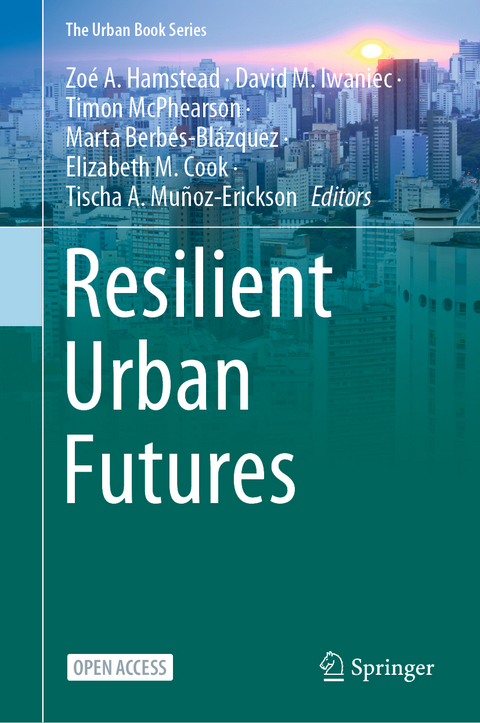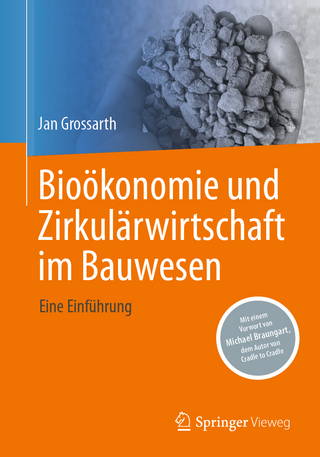
Resilient Urban Futures
Springer International Publishing (Verlag)
978-3-030-63130-7 (ISBN)
Although planning processes consider visions for the future, the editors highlight a more ambitious long-term positive visioning approach that accounts for unpredictability, system dynamics and equity in decision-making.
This volume brings the science of urban transformation together with practices of professionals who govern and manage our social, ecological and technological systems to design processes by which cities may achieve resilient urban futures in the face of climate change.
Zoé Hamstead is an Assistant Professor of environmental planning at the University at Buffalo and Director of the Community Resilience Lab, which provides support for climate equity and resilience planning. Her research advances a critical heat studies agenda, which is attentive to ways in which societal and cultural structures create, normalize, and obscure heat inequity. She teaches courses in environmental planning, environmental justice, economic concepts, geographic analysis of environmental problems, and engaged climate health equity studios.
David M. Iwaniec is an Assistant Professor of Urban Sustainability at the Urban Studies Institute, Andrew Young School of Policy Studies at Georgia State University. He is a sustainability scientist researching anticipatory and systems approaches to advance urban sustainability, resilience, and justice. His work focuses on the co-development of scenarios and transition pathways for positive futures of urban transformation.
Timon McPhearson is Director of the Urban Systems Lab and Associate Professor of Urban Ecology at The New School. He is a Research Fellow at The Cary Institute of Ecosystem Studies and Stockholm Resilience Centre and a member of the IPCC.
Marta Berbés-Blázquez is an Assistant Professor at the School for the Future of Innovation in Society at Arizona State University. Her research considers the human dimensions of social-ecological transformations in rural and urban ecosystems with an emphasis on vulnerable populations. Her work is informed by resilience thinking and political ecology at a conceptual level, and it is practically oriented toward qualitative, participatory, and anticipatory research methods. Specific topics of expertise include power dynamics and access in ecosystem services, scenario planning, resource extraction, eco-health, climate change adaptation, and trans-formation.
Elizabeth M. Cook is an Assistant Professor at Barnard College in the Department of Environmental Science. She is an urban ecosystem ecologist and her research focuses on future urban sustainability and human-environment feedback in urban and nearby native ecosystems. She conducts research on sustainability and resilience planning through participatory scenario development with local stakeholders. Her work seeks to understand cities as social-ecological-technological systems with a comparative approach in Latin American and U.S. cities.
Tischa A. Muñoz-Erickson is a Research Social Scientist in the USDA Forest Service's International Institute of Tropical Forestry, in Río Piedras, Puerto Rico. She studies urban sustainability governance, including the policy networks, know-ledge systems, anticipatory capacities, and strategies to advance sustainability, resilience, and equity. She is also actively involved in transdisciplinary platforms to facilitate the co-production of futures and transition pathways in the US and Latin American cities.
A framework for resilient urban futures.- How we got here.- Social, ecological and technological strategies for climate adaptation.- Mapping vulnerability to weather extremes.- Producing and communicating flood risk.
| Erscheinungsdatum | 09.04.2021 |
|---|---|
| Reihe/Serie | The Urban Book Series |
| Zusatzinfo | XI, 190 p. 44 illus., 41 illus. in color. |
| Verlagsort | Cham |
| Sprache | englisch |
| Maße | 155 x 235 mm |
| Gewicht | 484 g |
| Themenwelt | Naturwissenschaften ► Biologie ► Ökologie / Naturschutz |
| Naturwissenschaften ► Geowissenschaften ► Geografie / Kartografie | |
| Sozialwissenschaften ► Soziologie ► Spezielle Soziologien | |
| Schlagworte | climate change • Climate change impacts • future scenarios • Open Access Urban Book • sustainability science • Urban Futures • urban geography and urbanism • Urban Resilience • urban transformation |
| ISBN-10 | 3-030-63130-3 / 3030631303 |
| ISBN-13 | 978-3-030-63130-7 / 9783030631307 |
| Zustand | Neuware |
| Haben Sie eine Frage zum Produkt? |
aus dem Bereich


